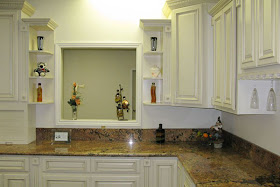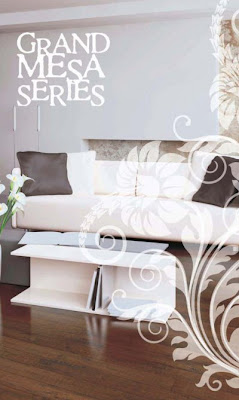Welcome back to the Stone Wood Outlet exclusive blog series, “Spring Renovation Projects”. This week we’re looking at an often unsung hero of the kitchen and bathroom design world: countertops.
Countertop products are not something one can easily install themselves – they require professional installation. That’s why this week’s renovation post focuses on the thing that you can easily handle in the countertop installation process: choosing the type of material to use.
Countertops say a lot about a homeowner’s personal style, and choosing the right material is a big deal when designing a room. But unless you’re familiar with the ins-and-outs of countertops, knowing which material will work best for you can be difficult. The following are the most common types of
countertop materials, a few of their pros and cons, and a final verdict on who should use which type and why. Enjoy!
Types of Countertop Materials
Laminate
Easy to clean, inexpensive, durable and available in a wide range of styles, choosing laminate countertops seems like a no-brainer. There are disadvantages, though. If damaged, laminate always needs to be replaced. It also has a tendency to crack or separate from its backing, and some homeowners don’t care much for the way it looks.
Verdict: Great choice if you’re on a budget, though you get what you pay for in terms of lifespan and appearance.
Tile
Tile is a truly versatile countertop material. It comes in many different colors, styles, textures, and designs, is durable, and is very easy to clean. However, tile stains easily, may harbor bacteria if not sealed, and has a tendency to crack.
Verdict: Tile is a great choice for designers that want a lot of versatility and choice. It may not be the best choice for people that put a lot of wear and tear on their countertops.
Marble
Often used for pastry tables, this beautiful, durable countertop material does have a few downsides. It is porous, it stains easily, and it can cost you quite the pretty penny.
Verdict: A great choice for someone that cleans a lot – or has someone else clean a lot. If you tend not to clean up messes right away, or get upset when something needs to be professionally cleaned or repaired, you might want to pass.
Granite
At the same time tough and delicate, granite is a paradox. On one hand, it is heat resistant, very hard, and comes in a number of different colors and patterns of stone. Unfortunately, granite is also very susceptible to grease stains, requires periodic resealing, and is usually a fairly expensive countertop material to acquire and install.
Verdict: Very ornate and very expensive, granite countertops don’t fit with every kitchen design scheme. They work best with rich, polished decors. If your kitchen is more on the simple side, don’t choose granite.
Stone
One of the toughest countertop materials available, stone is heat-resistant, relatively scratch-resistant, and most damage can be easily repaired by a professional.
Verdict: The biggest drawback to purchasing stone countertops is price. If you are on a tight budget you might want to look elsewhere. However, if you are willing to make an investment in your countertop material, stone will keep you happy for years to come.
Stainless Steel
This sleek, stylish countertop material is easily cared for, waterproof, scorch proof, and can be personalized by etching custom patterns into the finished material. It can also be quite noise, expensive, and a pain to repair or replace.
Verdict: Perfect for modern room decors, stainless steel can look out of place in an old-timey kitchen.
Wood
Wood countertops are making a comeback lately, and for good reason. They add a soft, natural atmosphere to any kitchen and are easily sanded and refinished. However, they also are very susceptible to burns, water damage, scratches, stains, and can be home to germs if not cleaned immediately after use.
Verdict: Wood countertops have long been used in kitchens and homes around the world, so if you like an old-fashioned, rustic feel, wood is right for you.































